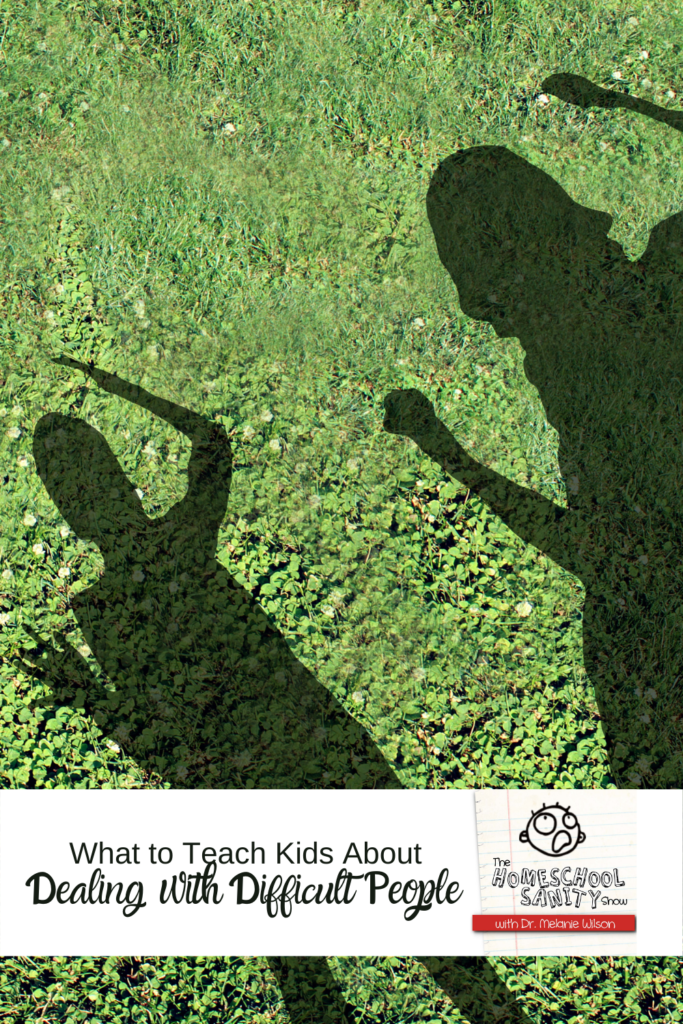One of the things I love about homeschooling is the opportunity to teach my kids things they wouldn’t learn in a traditional school. For example, I’ve done a podcast episode on how to teach kids to respond to others who are hurting or grieving. Today, I’m going to address how to help kids deal with difficult people.
My background in dealing with difficult people
I not only have professional experience in this area as a psychologist but also loads of personal experience. I haven’t enjoyed it at all, but I’m thankful that I can empathize with and counsel those who struggle to deal righteously with difficult people.
My talk on this topic at retreats has gotten excellent reviews. I do want to write a book on the subject when the Lord gives me a green light to do so. I have a different perspective on this topic than many Christian teachers do that comes from Scripture. In fact, I believe the traditional teaching on dealing with difficult people has caused considerable, unnecessary suffering.
Of course, I can’t tell you what to do in a particular relationship because I don’t know you or the situation. Even if I did, the fact is that people are unpredictable. And we simply don’t know what God has planned for your child and their difficult person. But I can share some biblical principles that I believe will serve your children well.
How do you define difficult person?
Before I share the principles, let’s discuss what it means to be a difficult person. We have all been difficult people by this definition. A difficult person is someone who repeatedly gets in the way of you achieving your goals. Let’s say your teen works at a restaurant and would like to move into a better-paying position. A difficult employee or even a frequent customer can get in the way of that goal by complaining about your teen or trying to one-up your teen.
A difficult person may be well-intentioned. She may not have any idea she is driving you crazy. In fact, this person may end up being a blessing at a later time. But a difficult person may also suffer from a mental illness or spiritual state that causes troubling behavior. In some cases, a difficult person poses a serious threat to others. God can also change this type of difficult person, but the way we approach them is different.
Principle #1 Get away from an abusive person if possible
That leads me to principle #1 for dealing with difficult people. If you can get away from an abusive person, do so. This notion runs counter to popular Christian advice. We are often told that we are to restore the relationship with such people if we are forgiving Christians. Yes, we are to turn the other cheek, but we don’t have to get close enough to let them have another slapfest at our expense.
In 1 Samuel, we read about David running from murderous, jealous Saul. In a scene where David doesn’t return evil for evil by sparing Saul’s life, Saul apologizes. David doesn’t hug him and return with him to “restore the relationship.” He travels far from him for his own safety. Yet David never stops caring about Saul and hoping he will obey the Lord. Jesus too avoids people who mean to do Him harm before His time. Like David, He never stopped loving those who persecuted him.
If you know someone is a threat to your mental or physical health, trust your gut. In David’s case, his friend Jonathan (Saul’s son) did not believe that his father would try to kill David. Only when his father tried to kill him too did he believe.
We all want to believe the best about people. So if you are dealing with someone who is abusive and dangerous, others may poo-poo your concerns. They may tell you that you need to forgive the person by restoring the relationship or meeting with them to talk things out. You don’t have to do that. In fact, in many cases, you are extending a kindness to someone by avoiding them. Saul was insanely jealous of David. Having David around made it worse. His absence allowed Saul to focus on the battles he was supposed to be fighting.
We want our kids to know that if they’re ever afraid of a difficult person and don’t know what to do, they should seek counsel. They should never agree to meet with an angry, controlling person alone. A college student from my neighborhood agreed to meet with her difficult ex-boyfriend by herself. He murdered her. We want our kids to understand that violence is unpredictable, but a history of verbal or physical abuse is a warning sign. They must pray for wisdom and protection.
Proverbs 22:24 says, “Do not associate with a man given to anger or go with a hot-tempered man.”
Principle #2: Don’t believe who a difficult person says you are
A healthy individual will talk to you about something you said or did that was a problem. You’ll be allowed to respond, explain, apologize, and commit to changing in the future if the situation requires it. A healthy person will forgive and/or apologize for their part in the problem. The incident, if it is not serious, will be forgotten.
But individuals who are psychopathic or narcissistic like to use your behavior to define your image and worth. You are what you do, and the worst possible assumption is made about why you behave the way you do. Your child may be labeled by this type of difficult person and told that many others agree with the label.
Saul labeled David a traitor who needed to be killed. This label was given, despite the fact that David had been loyal and obedient to a tee.
Obviously this type of behavior from a difficult person goes hand in hand with abuse. But sometimes we don’t recognize it as abusive. This is because what a difficult person says taps into an insecurity we have.
Some difficult people may engage in what’s called gaslighting. Gaslighting may cause your child to question her identity and her understanding of reality. A gaslighting friend of your teen’s may consistently say that your child isn’t friendly and that other people think she’s stuck-up, for example. Because your child does battle shyness at times, it’s easy to accept the difficult person’s assessment.
What’s interesting is that these difficult people intentionally target the most conscientious people with their gaslighting. They know you will question yourself because you don’t want to treat others poorly. They know they can cripple you with guilt, unlike more confident people who would tell the difficult person to get lost.
The way out of the mess for our kids is for them to recognize that only God gets to tell them who they are. While in the flesh they are a sinner guilty of much worse than what they’re being accused of, in Christ they are righteous. Have them read and reflect on Scriptures that remind them that they are chosen, redeemed, and holy in the Lord’s eyes.
Then have them take the advice of pastor Michael Wells. Have them tell the difficult person that if they are as bad as he says, he would do well to stay far from them.
1 Corinthians 6:11 says, “Some of you were once like that. But you were cleansed; you were made holy; you were made right with God by calling on the name of the Lord Jesus Christ and by the Spirit of our God.“
Principle #3: Expect God to use the difficult person in your life for good
God had blessed David with many gifts. He was attractive, a superior warrior, a great writer, and even a skilled musician. Saul’s persecution humbled David and forced him to depend on God.
When our kids have to deal with difficult people, they will also grow in humility and faith. They will learn to choose supportive relationships and to establish healthy boundaries.
Rather than considering how we might retaliate or defend ourselves, we must ask how God is at work through our difficult person. When King David was on the run from his traitorous son, a man mocked him. David stopped his servant from harming the man, saying that God Himself may have been using the man’s words for good. When our children believe that God uses even difficult people for our good, they are truly free. They do not have to live in fear. Instead, they can ask God what lesson He is teaching them.
In some cases, God may call us to return kindness for evil to heap burning coals on our difficult person’s head. This is what David did for Saul in sparing his life.
Whether the Lord’s directive is for us to love or to leave a difficult person or both, we are always called to pray for difficult people. King Saul did not repent before he died. But there was another Saul in the Bible. The believers ran from him and rightly so be cause he sought to imprison them. He also approved of their execution.
But God changed that difficult person into the greatest evangelist the world has known. Saul, later known as Paul, authored most of the New Testament and established the Christian church throughout the Roman world.
The miraculous change in Paul’s life is not work that God has ceased doing. He is still in the business of transforming people through the Holy Spirit and faith in Jesus Christ.
Romans 8:28 says, “And we know that for those who love God all things work together for good, for those who are called according to his purpose.”
Conclusion
If our children know three basic principles for dealing with difficult people, they will do well. First, they should avoid abusive people, if possible, and never meet alone with them. Second, they should build their identity on who God says they are in Christ, not on what difficult people say. And finally, they should know that God is using the difficult person in their lives for good. They must pray for difficult people as God directs.







